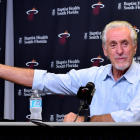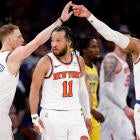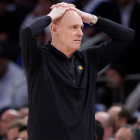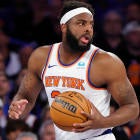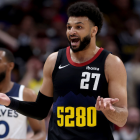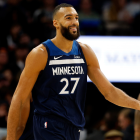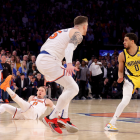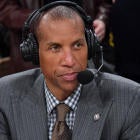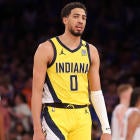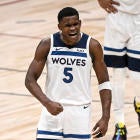Now that the dust has settled on the offseason, it's time to catch up on some teams that we haven't talked about much because they didn't do a whole lot. Continuity can be great if it helps a team grow, but nobody wants to be seen as stagnant. We'll start in Miami, where next to nothing has changed.
The Heat had easily the quietest summer of any NBA team. There are no significant additions and no significant losses from last year's roster, but they re-signed Wayne Ellington to a one-year, $6.2 million contract and Derrick Jones Jr. to a two-year, minimum contract. Dwyane Wade is still a free agent, but it would be a surprise if he didn't return … especially after he mentioned "Year 16" on Instagram on Tuesday.
No one is upset about bringing back Jones and Ellington. To the degree that there is frustration in Miami, it is that the front office has failed to move Hassan Whiteside, otherwise create financial flexibility or establish any sort of path toward championship contention. This is a free-agent destination, but after Pat Riley's front office couldn't convince Gordon Hayward to come aboard in 2016, it spent a ton of money to add Kelly Olynyk, extend Josh Richardson's contract and retain James Johnson and Dion Waiters, which meant it couldn't take part in this offseason's free-agent frenzy. It also meant that, while the Heat are undeniably good, it is now difficult to envision them becoming great.
Riley told the Miami Herald's Barry Jackson recently that this coming season will be "a pivotal year for these guys to try to dispel the notion and the perception out there that we are who a lot of people think we are." Translation: He does not think Miami is mired in mediocrity. OK!
For Riley to be correct, one of Miami's up-and-coming players -- Richardson, Justise Winslow, Bam Adebayo -- has to turn into a genuine star. The Heat's offense, which ranked 20th last season, has to make a significant jump. What is more likely, these things happening or them remaining in the East's murky middle? I'll go with the latter, which is why, as much as I like watching them, I can't get excited about their future.
The most memorable moment of the Trail Blazers' offseason was when Damian Lillard and C.J. McCollum expressed their disappointment that their front office didn't re-sign Ed Davis. At the beginning of free agency, the Brooklyn Nets nabbed Davis on a one-year, $4.4 million deal that seems extremely team-friendly, especially after Portland re-signed Jusuf Nurkic for four years and $48 million.
The Blazers' other moves: Signing Seth Curry for two years and $5.6 million, signing Nik Stauskas for one year for the minimum, drafting Anfernee Simons and Gary Trent Jr, letting Shabazz Napier and Pat Connaughton walk.
This all feels like a bit of a bummer after Portland was swept by the New Orleans Pelicans in the first round of the postseason. In the aftermath of that defeat, general manager Neil Olshey said that the front office would focus on acquiring "playoff-caliber guys." If the playoffs were to start tomorrow, though, there is no reason to believe the Blazers would be more ready.
On the one hand, Olshey can't go back in time and undo the damage that was done when Portland went on a spending spree two summers ago. While it is easy to say he should blow it up, you obviously don't just dump players as good as Lillard and McCollum. If there was no appealing, franchise-changing move to be made, it makes sense to wait. After all, the Blazers were third in the West last season. (And, hey, the Curry deal was nice!)
On the other, they only won three more games than the ninth-seeded Denver Nuggets. They needed a heroic run from Lillard in the second half of the season to get where they were. It feels like the team has stagnated, and Kevin Durant was right to laugh at the idea of Portland being close to championship contention. There are real concerns here.
Finally, a team we can feel good about. Of course the Celtics didn't overhaul their roster for a second straight summer -- they didn't need to. If everything goes to plan, their major "additions" will be the healthy versions of Hayward and Kyrie Irving, who will help take them to the NBA Finals for the first time since Brian Scalabrine was on the team.
CBS Sports' Colin Ward-Henninger gave Boston an A for its offseason, and I'd give it the same mark. Retaining Aron Baynes for two years and $11 million was an absolute bargain, considering how important he was to the team in the playoffs. Keeping Marcus Smart for four years and $52 million is a win for multiple reasons -- he does all sorts of stuff that helps the Celtics win, that is great value for a defender of his caliber and he could wind up being part of a trade for another star down the line.
I love the Robert Williams pick, despite everything. And with Danny Ainge's recent track record, I'm not going to to question him bringing in Brad Wanamaker and letting Shane Larkin go.
The big debate here is whether or not Boston should have made more of an effort to get Kawhi Leonard. Ainge reportedly was willing to give up draft picks in a potential Leonard deal, but not any of the team's core players. Was that a mistake? Should the Celtics have considered moving Irving before he gets a chance to leave in free agency? How worried should they be about Leonard falling in love with Toronto and being a thorn in their side for the next few years? I don't have the answers to these questions, but I'm not the least bit surprised that they stood pat. Like the rest of the world, I can't wait to watch this team.
Stan Van Gundy is gone, but the Pistons' win-now mandate has not changed. New coach Dwane Casey is expected to take them to the playoffs, and he will have essentially the same roster as Van Gundy did after the Griffin trade. This is what happens to capped-out teams.
Stretch big Anthony Tolliver and athletic wing James Ennis left in free agency. The additions: Glenn Robinson III and his untapped potential, rookies Khyri Thomas and Bruce Brown, veterans Jose Calderon and Zaza Pachulia.
Like the Celtics, Detroit is betting on internal improvement and better health. Ideally, Blake Griffin will be a top-15 player again, Reggie Jackson will remind people that he was actually pretty damn good before all the injury issues and there will be growth from Luke Kennard and Stanley Johnson.
There is a huge difference, though, between the Pistons and a contender like Boston. At best, with Griffin and Andre Drummond peacefully co-existing, with Jackson staying on the court, with Reggie Bullock making 44 percent of his 3-pointers again, with Jon Leuer making up for Tolliver's absence, Detroit will be merely a solid team rather than anything approaching an elite one. Years of aiming for mere respectability have robbed the team of having real upside.
Minnesota is basically running back the best team it has had since 2004, which sounds pretty good but could be troubling. The Wolves had to win a de facto play-in game to make the playoffs last season, and the road back there will not be easier. Rumors have been swirling for months about Jimmy Butler not being on the same wavelength as Karl-Anthony Towns and Andrew Wiggins, and no one knows exactly what this means for the franchise's future. Butler will be a free agent next summer.
In the meantime, Minnesota will try to be more cohesive next season. Maybe its pair of 3-and-D rookies -- guard Josh Okogie and forward Keita Bates-Diop -- will be able to help. Replacing Nemanja Bjelica with the older, less versatile Tolliver was confusing, but could help the Wolves' spacing. Re-signing Derrick Rose as quickly as they did was predictable and hilarious, and it immediately sent fans into a frenzy because it means Tyus Jones can be marginalized again. There will be some extra backcourt minutes, though, as it is clear that Jamal Crawford will not be returning.
Just like last season and the one before, we will enter this season wondering if Tom Thibodeau can fix Minnesota's terrible defense. It ranked 22nd in defensive rating in 2017-18, largely because Towns and Wiggins have not become the kind of defensive players they were projected to be when they were picked No. 1 overall. Nothing that Thibodeau's front office did this summer has changed the team's outlook -- if the Wolves are going to be more than they have been recently, then Towns and Wiggins need to make it happen.
The Jazz only won just one more game than the Timberwolves last season, so why does it feel like they're in a completely different, much better position going forward?
The answer starts with what Utah did in the second half of 2017-18. When Rudy Gobert got healthy, Donovan Mitchell hit his stride and Ricky Rubio got comfortable, it felt like the Jazz figured it out. They played like an elite team for a significant portion of the season, dominated defensively and, when they fell in the playoffs, it was to a truly great Rockets team that also happened to be a horrible matchup. With decent health and a second-year jump from Mitchell, it is easy to imagine Utah's win total climbing to the mid-50s, so bringing (almost) everybody back feels like a sensible thing to do.
The Jazz have been accused of overpaying Derrick Favors, but giving him $18 million this coming season was the cost of remaining flexible after that. They have also been accused of overpaying Dante Exum, but $33 million over three years could wind up looking fine if that defense he played against James Harden in the second round was a sign of what's to come.
Aside from re-signing Favors, Exum, Raul Neto and Georges Niang, Utah's offseason consisted of drafting Grayson Allen, waiving Jonas Jerebko and signing Naz Mitrou-Long and Jairus Lyles. I'll bet Allen earns a spot in Quin Snyder's rotation, and I'll bet the Jazz have home-court advantage in the first round of the playoffs.













